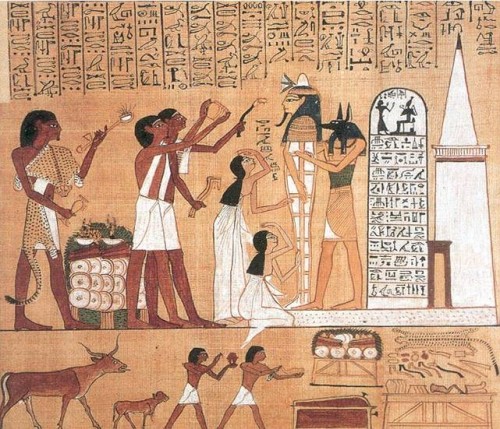The second in a series of guest posts which consider the question, ‘What is the purpose of a funeral?’ by Jenny Uzzell
The first ‘purpose’ of funerals that I am going to consider is the one that, arguably, has the least relevance to most people in the modern western world. For most of human history there has been a tacit assumption that funerary rites are an efficient cause of change of some sort on a spiritual level. In other words they ‘do something’ in the supernatural world. Either they ensure the safety, survival or wellbeing of the person who has died in the afterlife or they protect those who are still living from an otherworldly threat.
While there is some evidence (albeit hotly debated) for funerary ritual even before the emergence of Homo Sapiens, we cannot make more than an educated guess about the meanings of rituals and the beliefs associated with them until we are into the historical period and can read about what our ancestors thought they were doing. Even then it is no easy matter to be sure about what the funeral was expected to achieve.
The ancient funerals with which we are most familiar are, perhaps, those of Egypt. In the Old Kingdom it is not clear what afterlife expectations, if any, were held by the majority of the population. Only the Pharaoh, already partially divine even before his death, was assured of an eternal life as an aspect of the sun god Re. The soul or ba of the king made a perilous voyage to the Duat or underworld where it joined Re and so helped to preserve the future security of the kingdom. This apotheosis was a dangerous and complicated affair and could only occur if the funeral rituals were carried out with precision. The pyramid itself (sometimes referred to as the king’s ba or as his ‘horizon’) may have been a complicated piece of supernatural machinery designed to facilitate the Pharaohs transformation into a god.
By the Middle Kingdom the afterlife had become far more democratised and everyone expected to access the Duat after death. Literature of the period uses euphemisms for death that tell us much about Egyptian attitudes. Egyptians often refer to finding a ‘safe harbour’ or to reaching their father safely. This life was seen largely as a preparation for the next, and so to invest a large proportion of one’s wealth in securing a good afterlife seemed quite rational; after all, the next life will last much longer than this one.
Egyptian belief of this period was very complex. The human in the otherworld was comprised of the ba (similar to our idea of ‘soul’ this was, essentially the personality) the ka (life essence or vitality) and ankh (intellect). The ka needed to be sustained with food and drink offerings and needed a place to live. This was the mummy, which had to be recognisable so that the ka could find it easily. Many tombs have a false ‘ka door’ through which the spirit could come and go. Only if all three of these elements elements were successfully reunited by the funeral rites could the person live again. It was therefore imperative that the rituals were carried out with absolute precision; the right words, pronounced correctly at the right time and accompanied by the right action. This could only be performed by highly trained priests who held an honoured position in Egyptian society since it was only through their skills and knowledge that one could hope to live again after death. The purpose of the funeral was to ensure the continued life and well-being of the person who had died. This in turn served the living who could expect their sons to do the same for them and ensured that the ancestors, well fed and cared for, would look out for them in this world.
All of this seems a far cry from the modern world, and many would argue that most funerals today do not aim to bring about a real change to the person who has died or to those they leave behind, but many modern traditions actually grew from such beliefs and there are those for whom this is still the most important aspect of a funeral.
Another ancient culture for which the funeral was crucial for the well being of the whole of society was Vedic India and it is to this that we will turn next.



Fascinating – thank you Jenny. And not such a far cry from today when you think about how we might dress our dead in special clothes; put a bottle of whisky or a cuddly toy in the coffin with them for their ‘final journey’.
Very true, Kitty…but ‘grave goods’ are not always a sign of afterlife belief…then or now. More on this in a future post. 🙂
Thanks Jenny, you could dwell on this one subject alone—funeral as journey to the afterlife—for many posts. I look forward to your insights into Vedic beliefs.
Egyptian reference to ‘safe harbour’ is poetic. Man abhors death, fights to live and yet so often clings to the belief that there’s life beyond death, that it’s not nothingness that awaits us. And if it’s not nothingness, the alternative mystery of spiritual life can be shipwreck or safe harbour. We, therefore, invest in preparations to ‘merit’ the latter. In this, so many faiths are variations on the same theme.
Absolutely, Richard, and an obvious metaphor to find in Egypt where so much of daily life revolved around boats!
Oh I don’t know, there are still people who believe you must have a highly trained ‘priest’ to say the right words over your corpse or else you’ll burn in hell.
[…] some form then the purpose is clear and I talked about this at length in the previous two articles here and here. Where there is a hope rather than a belief, then this will be expressed and affirmed by […]